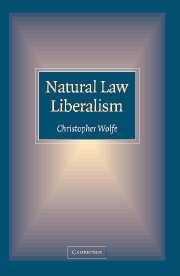Book contents
- Frontmatter
- Contents
- Acknowledgments
- Introduction
- PART I CONTEMPORARY LIBERALISM
- PART II LIBERALISM AND NATURAL LAW
- 7 Understanding Liberalism: A Broader Vision
- 8 Understanding Natural Law
- 9 Liberalism and Natural Law
- 10 “Cashing Out” Natural Law Liberalism: The Case of Religious Liberty
- 11 A Natural Law Public Philosophy
- Index
9 - Liberalism and Natural Law
Published online by Cambridge University Press: 24 July 2009
- Frontmatter
- Contents
- Acknowledgments
- Introduction
- PART I CONTEMPORARY LIBERALISM
- PART II LIBERALISM AND NATURAL LAW
- 7 Understanding Liberalism: A Broader Vision
- 8 Understanding Natural Law
- 9 Liberalism and Natural Law
- 10 “Cashing Out” Natural Law Liberalism: The Case of Religious Liberty
- 11 A Natural Law Public Philosophy
- Index
Summary
Having given some basic accounts of the development and core ideas of liberalism and natural law, and specifically of the topic of natural law and liberty, I now want to turn to the question of the relationship between liberalism and natural law. I will argue that they are fundamentally compatible and that the harmony between them makes possible a genuine natural law liberalism.
THE TRUTH NATURAL LAW SEES IN LIBERALISM
In what follows, I will generally argue that proponents of natural law can and should readily embrace the core principles of liberalism, although they will take particular positions in the intra-liberalism debates over the ground and scope of some of those principles. The main principles of liberalism are not just defensible from a natural law perspective, but are good. Natural law theorists can also accept much of what I have called the “tendencies” of liberalism, but here they may see a greater need to qualify or limit these tendencies in various ways. Those qualifications redound, however, to the benefit of liberalism.
Natural Law and Core Principles of Liberalism
Let us begin by asking how a natural law theorist might evaluate the core principles of liberalism.
Human Dignity Rooted in Equality
Natural law theory is strongly committed to the notion of human dignity, rooted in human equality. This dignity involves a high respect or recognition of worth, some form of inviolability, and the inherent possession of rights.
- Type
- Chapter
- Information
- Natural Law Liberalism , pp. 185 - 216Publisher: Cambridge University PressPrint publication year: 2006
- 1
- Cited by

